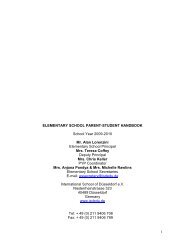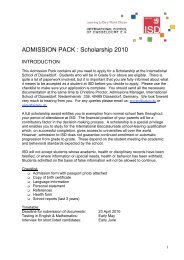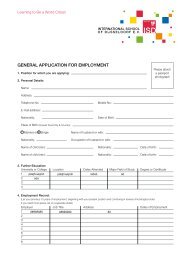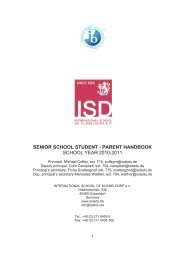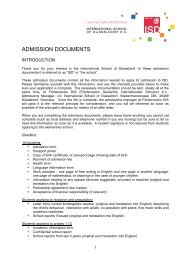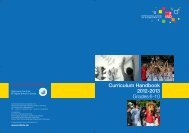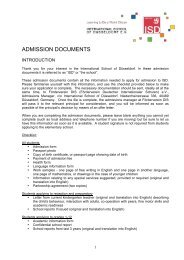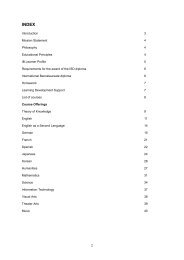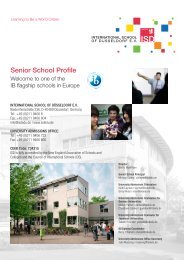Curriculum Handbook 2012-2013 Grades 11-12 - International ...
Curriculum Handbook 2012-2013 Grades 11-12 - International ...
Curriculum Handbook 2012-2013 Grades 11-12 - International ...
You also want an ePaper? Increase the reach of your titles
YUMPU automatically turns print PDFs into web optimized ePapers that Google loves.
IB DP Economics<br />
Aims:<br />
The IB Economics course at both higher level and standard level attempts to:<br />
• provide students with a core knowledge of economics<br />
• encourage students to think critically about economics<br />
• promote an awareness and understanding of internationalism in economics<br />
• encourage students' development as independent learners<br />
• enable students to distinguish between positive and normative economics<br />
• enable students to recognize their own tendencies for bias.<br />
IB DP Economics SL<br />
This is a two-year course. The material to be studied is divided into four distinct<br />
topics: resource allocation - which deals with supply and demand, elasticity and the<br />
market; national income analysis which covers the role of government policy, the<br />
measurement of national income, Keynesian versus monetarist analysis, inflation,<br />
unemployment and supply-side policies; international trade including protectionism,<br />
balance of payments and the measurement of trade; and economic growth and<br />
development which favours sources and consequences of economic growth; barriers<br />
to economic development and growth and development strategies.<br />
IB DP Economics HL<br />
This is a two-year course, which covers the material in the standard course, with<br />
additional concentration upon business economics, macroeconomic policy, absolute<br />
versus comparative advantage and exchange rates. This material includes profit<br />
maximization in different market structures, economic efficiency; inflation v<br />
unemployment trade-off, accelerator and multiplier theory, measurement of inflation;<br />
fixed versus floating exchange rates and terms of trade. Strong writing skills and an<br />
ability to effectively model economic theory through the use of diagrams are<br />
necessary for this course.<br />
IB DP History SL<br />
Aims: To<br />
• Promote the acquisition of knowledge and understanding of the past sufficient to<br />
serve both as a basis for the development and practice of appropriate skills and<br />
for a better understanding of the present<br />
• Provide an introduction to the nature of history as a discipline, the nature and<br />
variety of historical sources and the historian’s method<br />
• Develop an awareness of the existence of different interpretations of the past.<br />
This two-year course is identical to the first year of IB Higher Level History. All<br />
students are required to choose from the following topics:<br />
• Causes, practices and effects of wars;<br />
• The rise of single-party states;<br />
• East-West relations after 1945.<br />
Further details are given in the next course description.<br />
28<br />
ENGLISH<br />
Starting in 20<strong>11</strong>-<strong>12</strong>, the structure of Groups 1 and 2 of the Diploma Programme will<br />
change.<br />
Overview of group 1 and 2 changes<br />
Group Last examinations<br />
<strong>20<strong>12</strong></strong><br />
Group 1<br />
Group 2<br />
Language A1 (SL)<br />
Language A1 (HL)<br />
Language A2 (SL)<br />
Language A2 (HL)<br />
Language B (SL)<br />
Language B (HL)<br />
13<br />
First teaching 20<strong>11</strong><br />
First examinations <strong>2013</strong><br />
Language A: literature (SL)<br />
Language A: literature (HL)<br />
Language A: language and<br />
literature (SL)<br />
Language A: language and<br />
literature (HL)<br />
Language B (SL)<br />
Language B (HL)<br />
Students are required to select at least one language from group 1. They are also<br />
required to select a different second language from either group 1 or group 2.<br />
Students also have the option of studying a third language (from either group) as an<br />
elective instead of a group 6 subject.<br />
Evaluation<br />
Evaluation reflects students’ performance in a variety of the following: individual and<br />
group participation, oral presentations, written work such as essays, commentaries,<br />
responses to literature and/or non-fiction, creative projects, etc. Specific criteria will<br />
accompany all formally assessed tasks to indicate expectations.<br />
IB DP English B SL/HL 1 and 2<br />
Prerequisite: English 10 or the equivalent<br />
The IBO states that these are language acquisition courses designed to provide<br />
students with the necessary skills and intercultural understanding to enable them to<br />
communicate successfully in an environment where the language studied is spoken.<br />
This process encourages the learner to go beyond the confines of the classroom,<br />
expanding an awareness of the world and fostering respect for cultural diversity.<br />
These courses use a balance between approaches to learning that are teachercentred<br />
(teacher-led activities and assessment in the classroom) and those that are<br />
learner-centred (activities designed to allow the students to take the initiative, which<br />
can also involve student participation in the evaluation of their learning). The teacher<br />
is best placed to evaluate the needs of the students and is expected to encourage<br />
both independent and collaborative learning. Both courses develop students’<br />
linguistic abilities through the development of receptive, productive and interactive<br />
skills. It is a two-year programme for students with about three to four years of<br />
previous English learning. It follows the IB Language B syllabus which is comprised<br />
of three parts: language, texts and cultural awareness. Students may take the<br />
course for certification or as part of the full diploma programme, but in either case<br />
will be required to take the externally moderated written and oral IB exams.



